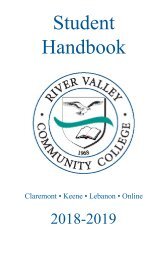You also want an ePaper? Increase the reach of your titles
YUMPU automatically turns print PDFs into web optimized ePapers that Google loves.
Qualitative Aspects of Accounting Practices<br />
PART I – REQUIRED COMMUNICATIONS<br />
Management is responsible for the selection and use of appropriate accounting policies.<br />
The significant accounting policies used by CCSNH are described in Note 1 to the financial<br />
statements.<br />
During the year ended June 30, 2018, CCSNH adopted new accounting guidance,<br />
Governmental Accounting Standards Board (GASB) Statement No. 75, Accounting and<br />
Financial Reporting for Postemployment Benefits Other Than Pensions (GASB 75). The<br />
changes made to the basic financial statements to comply with GASB 75 have been<br />
reported as an adjustment as of the beginning of the year ended June 30, 2018. Because<br />
management determined it was not practical for CCSNH to determine the amounts of all<br />
deferred inflows of resources and deferred outflows of resources related to the other postemployment<br />
benefit (OPEB) plans as of June 30, 2017, the beginning balances of deferred<br />
inflows of resources and deferred outflows of resources related to the OPEB plans have not<br />
been recorded. The impact of the adoption of GASB 75 as of the beginning of the year<br />
ended June 30, 2018 was as a net OPEB liability and cumulative effect of change in<br />
accounting principle of $143,484,240.<br />
No other new accounting policies were adopted and the application of existing policies was<br />
not changed during 2018. We noted no transactions entered into by CCSNH during the<br />
year for which there is a lack of authoritative guidance or consensus. All significant<br />
transactions have been recognized in the financial statements in the proper period.<br />
Accounting estimates are an integral part of the financial statements prepared by<br />
management and are based on management’s knowledge and experience about past and<br />
current events and assumptions about future events. Certain accounting estimates are<br />
particularly sensitive because of their significance to the financial statements and because<br />
of the possibility that future events affecting them may differ significantly from those<br />
expected. The most sensitive estimates affecting the financial statements were:<br />
• The estimates used in the calculation of the net OPEB liability, deferred inflows of<br />
resources and deferred outflows of resources related to the OPEB plans. The net OPEB<br />
liability and related deferred inflows of resources and deferred outflows of resources<br />
related to the OPEB plan administered by the State of New Hampshire (the State) are<br />
based on the December 31, 2016 actuarial valuation, updated to the measurement date of<br />
June 30, 2017, which was prepared by Segal Consulting, the actuary engaged by the<br />
State. The net OPEB liability and related deferred inflows of resources and deferred<br />
outflows of resources related to the OPEB plan administered by the New Hampshire<br />
Retirement System (NHRS) are based on actuarial information provided by the NHRS and<br />
audited by KPMG.<br />
• The estimates used in the calculation of the net pension liability, deferred inflows of<br />
resources and deferred outflows of resources related to the pension plan, which are based<br />
on actuarial information provided by the New Hampshire Retirement System and audited<br />
by KPMG.<br />
• The allowance for loan losses related to the note receivable on the Stratham Property.<br />
• The estimated useful lives of capital assets used in the calculation of depreciation<br />
expense, which are based on the perceived life of the related capital assets<br />
170 | P a g e





